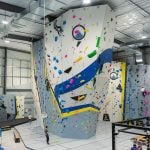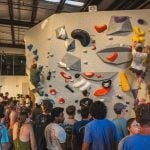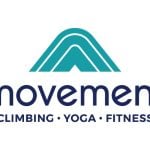Behind the Desk is a series that interviews people who are part of the climbing industry, whether owning gyms, managing staff, jumpstarting companies, or championing interesting ideas. For this installment, we talk to Jacquelyn Horton at Contact Climbing—the recipient of the most nomination votes for CBJ’s 2021 Business Leaders survey. Horton had a background in the hospitality industry before opening the gym, and found some interesting parallels. “Really good hospitality, in my opinion, is simply caring for others. And the indoor climbing gym industry, though not exactly the same as a high end resort or restaurant, isn’t actually that far off,” Horton says. We wanted to learn more about that idea, the gym’s opening, and the specifics of its environmental mission. Here’s what Horton had to say.

Name: Jacquelyn Horton
Title: Gym Manager / Co-Founder of Contact Climbing
Location: St. George, Utah
CBJ: Contact Climbing is your first venture into founding and managing a gym. Now that you’ve been at it for a while, what stands out as the aspect that surprised you the most?
HORTON: This question is a little hard to answer—I don’t honestly think I was surprised much. Being the first time I’ve done something quite like this, I allowed myself a lot of grace to make mistakes. I knew what my strengths were, and I knew that I’d spend a lot of time trying things, making mistakes, trying new things, and switching it up if we needed. I also leaned on my team pretty heavily. Accumulatively, they have decades more climbing gym experience than I did—and still do—and I’m happy to ask for help…and I’m comfortable admitting when I’m wrong or that I don’t have the answer. Coming from a background of fast-paced, high-end restaurants, we’re groomed to make decisions on the fly or pivot entirely if necessary.
I spent a lot of time during our first year open listening to people, trusting our team, and respecting their experiences and opinions. It has allowed me to be open to learning, open to making mistakes, and consequently impervious to things that might surprise some people. Every day was a new adventure and a new opportunity to learn and grow and I loved every second of it.
What have been the most challenging parts of that whole process?
The opening process was really tough because there is literally only a finite amount of money and you have to take whatever you have (and odds are, it won’t be enough) and you have to find a way to hire enough of the right people and pay them enough to get them to join you in opening a business. We didn’t know how busy we’d be or how many people we’d need—and if we’d have too many people or not enough. In our situation, we didn’t have enough money to pay people the wages they deserved upon opening and I couldn’t just magically make that number higher. What I did to combat this is I took every opportunity to ensure that my team knew that they mattered most to me. I worked extremely hard to ensure that they knew that I would do everything in my power to get them to a place they were happy with as fast as possible. We were fortunate to be able to give everyone raises fairly quickly, but they could still very easily find a job elsewhere that paid much better. I sincerely don’t believe though that they would be able to find a manager who appreciated their individual talents as much as I do, and this carries so much weight in a society who is working harder and harder to prioritize their happiness.

So, based on your experiences thus far, what makes a good climbing gym manager?
The thing we can do best as managers in any business is care for our staff—I mean sincerely care about the unique well-being of every individual. This helps with every aspect of running and managing a business, and frankly makes every aspect of my job easier.
I am surrounded daily by people who know that I truly care about who they are and the things that are important to them, and it has consequently allowed me to be surrounded by people who I know also care about me and each other. We spend a lot of time sharing experiences about some of the cool things that have happened to us in and out of the gym, and we celebrate each other and our successes daily. We also talk a lot about our challenges in and out of the gym. We check in on each other and our struggles physically, emotionally and mentally, and I do the best I can to ensure that the team know that this place is one where they can seek refuge from the trials of normal life. Our climbing gym is a safe space to come in and be happy or sad or depressed or anxious or anything else our team might be feeling. I work exceptionally hard to ensure that the team know that I will support them no matter what trials they might be going through and that I want them to feel safe coming as they are. Nothing, in my opinion, is more important than this.
Contact Climbing has more of an overt environmentally conscious mission than most other gyms. What prompted that—and can you explain some of the specifics?
When we began the process of building and opening Contact, I knew pretty early on that I wanted to run the operational side of the gym and I wanted to make sure that I was proud to be there every day. This sense of pride, for me, is linked to many things, but a large factor is the impact we’re making on the environment. There are so many simple and easy actions we can take to ensure that we’re doing our part…for example, having only hand dryers in bathrooms in lieu of paper towels, and not selling any single use plastic bottles. We have multiple water bottle filling stations and sell Nalgenes, as well as only sell beverages in containers that are recyclable.
There’s always more we can do to ensure that we’re being thoughtful about our environmental footprint, but these are some of the items that I find are the simplest to implement and send a clear message about who we are and what’s important to us.

Beyond Contact, are you of the opinion that the gym industry is on the right track, in terms of how most managers are operating their gyms?
I definitely don’t want to use this as an opportunity to glorify myself, but a lot of my current team have previously worked at other climbing gyms and/or are exceptional in their fields. I’ve consequently heard many stories and it seems to be a pretty common theme that people don’t feel respected, paid well enough, and/or are incredibly overworked. I think all of these problems boil down to the disconnect between the people working at and/or running the gym and the people who make the rules and sign the checks. Do the managers and owners know what it feels like to sit in a harness all day routesetting, or how tough it can be to teach an entire family how to belay, or how defeating it might feel to have an adult man tell a young woman that she shouldn’t dare correct his belaying because she clearly doesn’t have as much climbing experience as him? These are common occurrences—and I can think of 100 more difficult examples off the top of my head—and they’re pains that I don’t believe many managers and owners have felt or really truly understand. Granted, I know I’m generalizing, but as a manager or owner, when is the last time you set a route or taught a belay instruction or attempted to correct an exceptionally difficult guest? When your staff are struggling through some of these pains, where are you? I can tell you that odds are I am, or one of my other managers or supervisors are, close enough by that that person can turn around and ask for help.
I also understand that there isn’t always money to pay people more, and that sometimes businesses are understaffed. But having the most utmost respect for your team and being willing to pick up any slack and being willing to work alongside them helps ease those pains until you can be in a position to pay people their worth. Also, saying the words, “Hey Jess, I appreciate you,” could—and should—happen more. We should never ever assume that our team knows we appreciate them.













